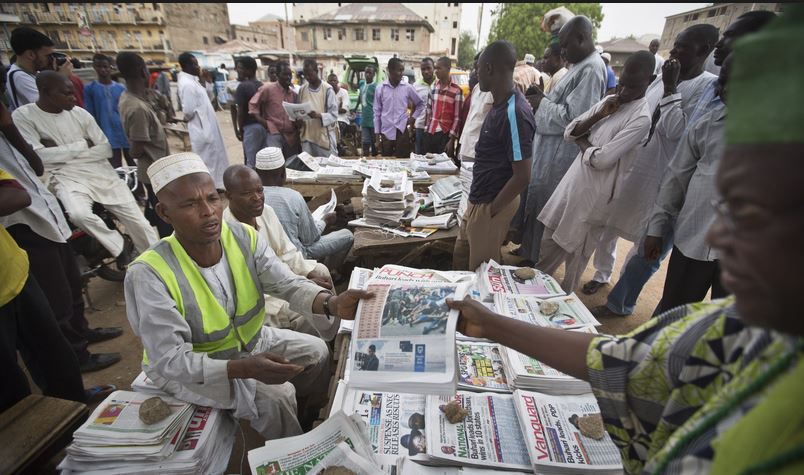The impact of weeks of youth protests on the Nigerian economy and the criticisms that trail the fines imposed on three television stations by the National Broadcasting Commission (NBC) for alleged “unprofessional coverage” of EndSARS protests dominate the headlines of Nigerian newspapers on Tuesday.
The Guardian reports that following weeks of youth protests, the Nigerian economy faces more economic risks in the areas of unemployment, capital flight, and cost of living. Tension continues to build across the country as protests against bad governance and police brutality become widespread.
Tagged #EndSARS, the movement was to express youths’ disapproval of perceived societal anomalies. It was, however, hijacked by hoodlums, who, for days, dealt deadly blows on the bleeding economy — looting public and private facilities. This has kept youths and vandals on the streets halting business activities and free flow of movement in major city centres.
Experts project that the current situation could worsen the already compromised economy, evident in the rising cost of living as a result of inflation. Cost of living reached post-recession’s all-time high in September when the inflation rate hit 13.71 percent. It was the highest in 31 months, after the 2017 price crisis.
With the year-on-year (YoY) inflation rate recording unbroken higher percentage points (every month) since last year’s August, Nigeria seems to be on its way back to the situation of three years ago.
The newspaper says that the National Broadcasting Commission (NBC) has come under fire for fining Arise TV, Channels Television and the African Independent Television (AIT) about N3m for alleged “unprofessional coverage” of EndSARS protests and the use of unverifiable social media reports.
The Acting Director-General of NBC, Prof. Armstrong Idachaba, who announced the punitive measures yesterday, in Abuja, had alleged that at the early stage of the protest, reports available to the commission indicated the broadcast industry largely gave a fair and balanced coverage but the trend became completely reversed when violence, wanton destruction and looting were introduced.
Idachaba alleged that “Channels Television, Arise TV and AIT especially continued to transmit footages obtained from unverified and unauthenticated social media sources, adding that the pictures stimulated anger and heightened the violence that was witnessed during the crisis.”
He said: “We believe the whole country has now seen why the spurious and recklessness on the social media must not be patronised by the mainstream traditional media. We are at the stage of our nation’s history when our broadcasters have a crucial responsibility for responsive and professional broadcasting. By picking unverified, unsubstantiated social media sources and repeating the narratives, our broadcasters have shown crass lack of professionalism and a disposition to be escalators of conflict and, more seriously, a threat to Nigeria. Look at the level of damage, killings that have happened on account of unverifiable reports”.
ThisDay reports that the Department of Petroleum Resources (DPR) has said that the 5,000 barrels per day (bpd) Waltersmith Modular Refinery project is fully ready for operations.
The Director of DPR, Mr Sarki Auwalu, stated this during a pre-commissioning visit to the project site located in Ibigwe, Imo State recently. The refinery was officially scheduled for inauguration yesterday (October 26, 2020) but had to be put on hold due the nationwide protest.
Auwalu said the purpose of the visit was to make sure that Waltersmith Refinery was ready to start operations. “We can confirm that the refinery is very much ready to commence operations. We have seen all the preparations. To us, the plant is alive. The commissioning is just symbolic. Everywhere is ready to start off. My overall assessment is excellent.
“We have been to other modular refineries but we have not seen anything like this: the space, the way it is arranged and the way it will work,” Auwalu said.
The Punch reports that the members of the Organised Private Sector have appealed to the Federal Government, state governments and commercial banks to support businesses that have been plundered, looted or vandalised across the country.
Specifically, the Lagos Chamber of Commerce Industry and the Manufacturers Association of Nigeria stressed that the hoodlum attacks on properties and livelihood had a serious economic impact on the country.
They called on the Federal Government to provide support in the form of grants to all the victims of the recent crisis. The President, LCCI, Toki Mabogunje, in a statement on Monday, said the families of all those who lost their loved ones should be adequately compensated.
She called on the Federal Government to support Lagos State in the rebuilding of the assets that were destroyed by the hoodlums that hijacked the peaceful protests. This, according to her, has become necessary in view of the current challenging economic conditions that the state is already grappling with.
The Sun reports that the Federal Government has admitted it has been grappling with weak economy since 2016 when Nigeria slipped into recession with a Gross Domestic Products (GDP) tapering around 2.6 percent in 2019.
Speaking at the 3rd Shell Company in Nigeria’s Ethics and Compliance Day, in Abuja, Minister of State, Budget and National Planning, Prince Clem Ikanade Agba, said that International Monetary Fund (IMF) predicted that Nigeria’s economy will contract by 4.3 per cent in 2020, lower than the 3.5 percent negative growth it had earlier estimated for the country in April, 2020.
“The pandemic triggered worldwide containment measures, including quarantines, lockdowns, physical distancing etc. These, have, however, had devastating implications for global economy as they led to a contraction of the world economy due to their effects on global demands and supply.
This has resulted in severe economic downturns, upward pressure on unemployment and poverty and shutdown of several businesses while greatly reducing the size of operations of many others.
GIK/APA


